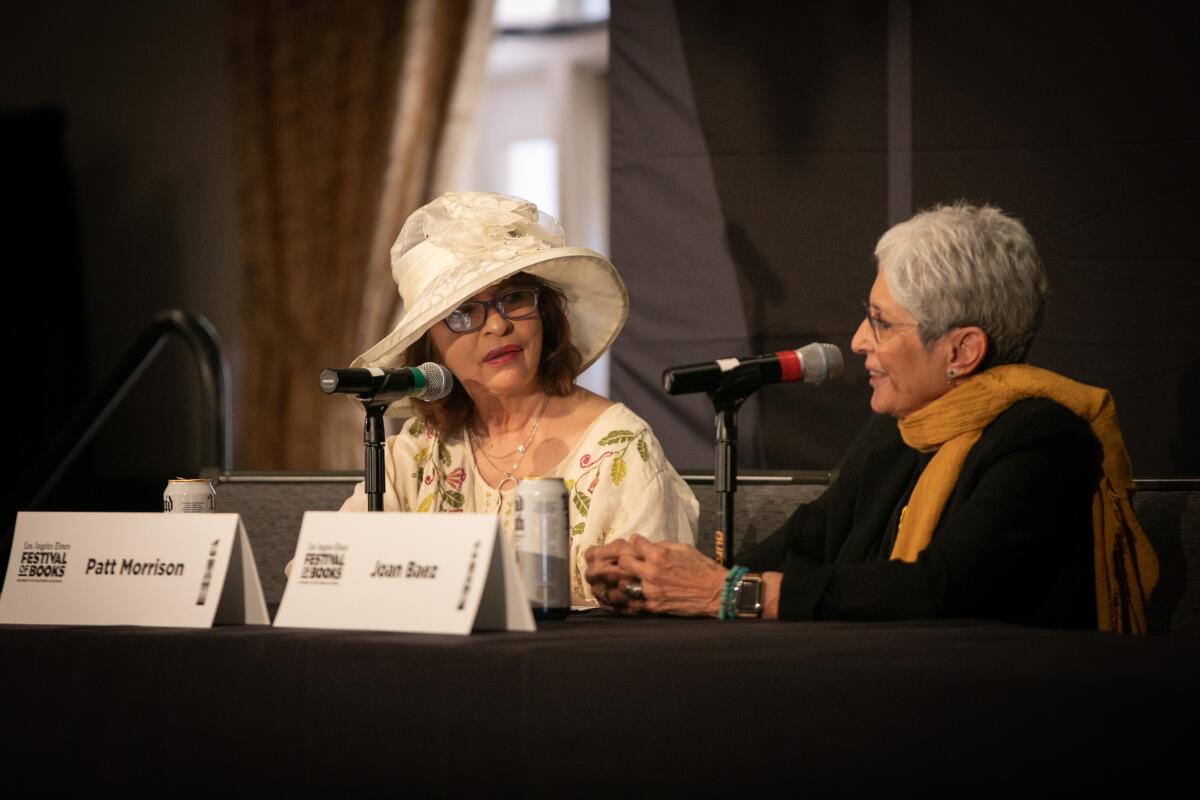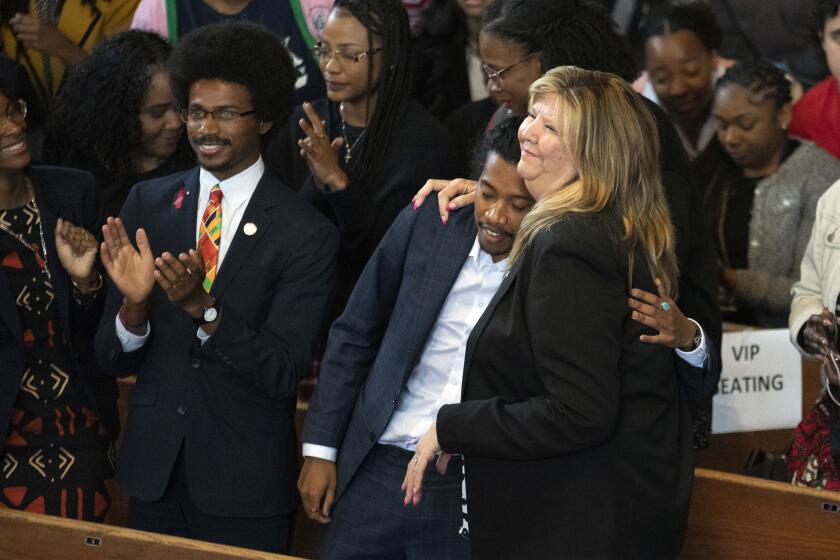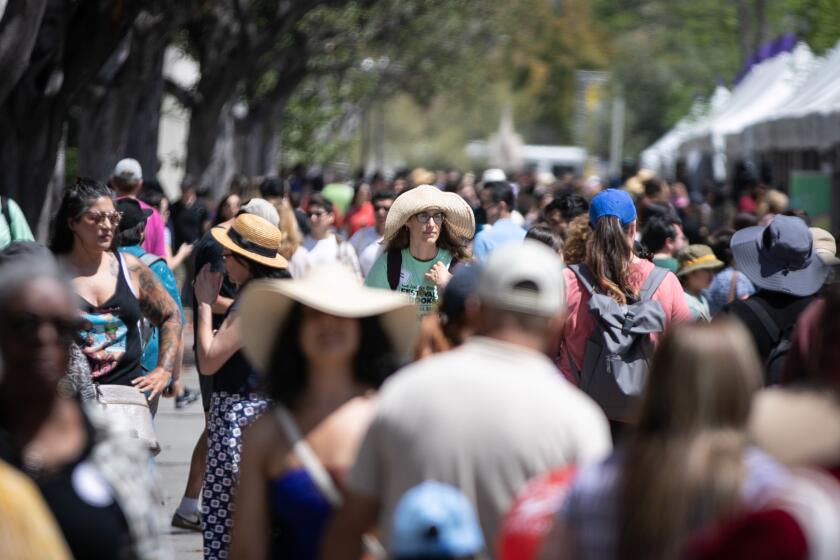Joan Baez talks book bans and going full ‘fan-girl’ for embattled Tennessee Rep. Justin Jones

Joan Baez doesn’t like being called a legend.
“I realized that I hated it because I was not also current,” Baez said Sunday at the L.A. Times Festival of Books to a packed room of people for whom Baez is a soundtrack of their lives.
But just earlier this month a video of Baez with expelled Tennessee state Rep. Justin Jones went viral. The two bumped into each other at Newark airport and sang an impromptu rendition of “We Shall Overcome,” an anthem of the civil rights movement that Baez notably sang during the March on Washington.
Jones tweeted the video, which has been viewed 4.8 million times, reshared across social media platforms and discussed on late-night talk shows, proving that Baez isn’t current, she’s timeless.
On the second day of the weekend festival, Baez told The Times’ Patt Morrison that when she saw Jones, she did the “fan-girl thing.”
“By the time he tapped me on the shoulder I was already in Justin’s arms,” she said. “I flew across the room. And he said, God bless you, Joan Baez. ... I consider myself blessed.”
Nashville officials vote to reinstate one of the Black Democratic lawmakers expelled by Republicans over a gun protest after a school shooting.
Baez is known for her political activism and her close friendship with Martin Luther King Jr., in addition to her folk music. She’s since retired from performing publicly, and she’s sharing her writing and illustrating talents with the world.
“Am I Pretty When I Fly? An Album of Upside Down Drawings” is Baez’s latest passion project, and her collection of sketches features recurring themes of politics, women, animals and family.
“I don’t know what’s going on up there until I do the drawing. And I’m as surprised as anybody when I turn it right side up,” Baez said. “I was sort of an outsider kid my whole life. So I had to create my own little world. I realized I could draw when I was really young. I drew pictures of Bambi and Thumper and sold them for three cents apiece.”
Baez told Morrison that her love of drawing as a kid was replaced with music when she got her hands on a guitar.
“When I was really starting with both music and the guitar, it was all-consuming and I would literally be playing the guitar learning a song, fall asleep with a guitar on my chest, wake up and go on playing.”
Joan Baez has commanded stages since 1959, back when she was a raven-haired teenager parting audiences’ hair with her piercing soprano in folk clubs around Boston.
The folk singer credits the spirit of the era in which her career was born for producing the “extraordinary talent” of artists including Joni Mitchell, Bob Dylan, the Beatles, Janis Joplin, and Peter, Paul and Mary.
“I think it’s not coincidental that it was the end of the war in Vietnam, civil rights marches and all that were over. And part of the spirit that brought this music out, was that tension,” she said. “My day — during those crises and those marches, the civil disobedience — was defined for me as I got up.”
The “Diamonds and Rust” singer admitted struggling in the aftermath, feeling depleted and asking herself, “Where do I belong?”
But Baez is still a folk singer and political activist at heart. She hadn’t written a song in 25 years when she released “Nasty Man” in 2017, which she said was inspired by the direction of America and the rise of Donald Trump. The opening lyric is, “Here’s a little song about a man gone wrong.”
One of the sketches in “Am I Pretty When I Fly” features a man wearing a cross necklace, with “hate” tattooed on his arm, and the words “You say luncheon? Thought I heard lynchin’!” scrawled beside him.
“Can you see the people walking out of the Legislature in Nashville? I mean, they’re proud white supremacists,” Baez said. “And I think they got a shock that there were people not supporting them the way they had expected to be supported.
“It is the age of bullying and it’s all been made OK by the Trump figure, and by the people who will follow that [and] may not even know that they’re doing it. Suddenly bullying is fine.”
Labor movement leader Joe Hill was saluted on the 100th anniversary of his death Tuesday at the Troubadour in West Hollywood with a gathering of musicians that spanned generations and genres for a salute to the tradition of social and political activism in popular music.
Baez also touched on the uptick in book bans, saying, “If somebody’s coming to take out the book ‘Catcher in the Rye’ because it’s too controversial or too commie, you need to go to the library and sit with a librarian or lie down on her desk or something like that. Say no, I’m keeping ‘Catcher in the Rye.’”
When the Q&A portion of Baez’s panel began, an audience member asked if she still kept in touch with Dylan, with whom Baez performed and had a romantic relationship in the ‘60s. “No,” she said without further explanation.
What appeared to be one of the youngest members of the audience asked Baez to share the best advice she’d ever received, to which the folk icon replied: “My niece stood up and she said, ‘If 20 people tell you you have a tail, you should turn around and look.’”
When the panel concluded, Baez received a standing ovation.
The most fascinating people, events and moments at the L.A. Times Festival of Books: Mattew Perry, Rachel Kushner, James Ellroy, Katie Porter and more
More to Read
Sign up for our Book Club newsletter
Get the latest news, events and more from the Los Angeles Times Book Club, and help us get L.A. reading and talking.
You may occasionally receive promotional content from the Los Angeles Times.











